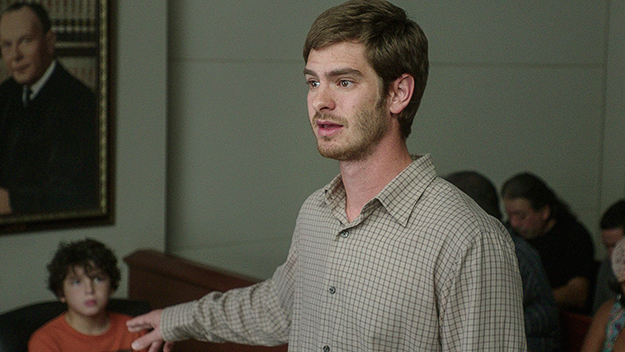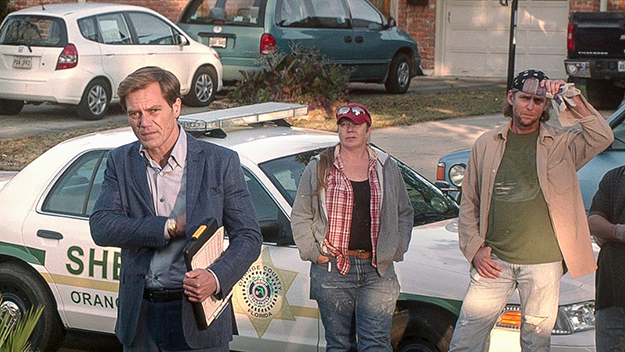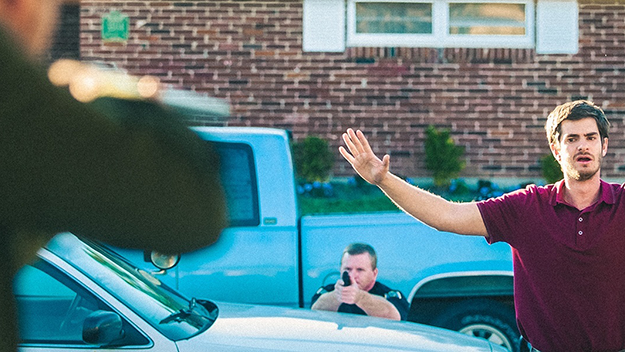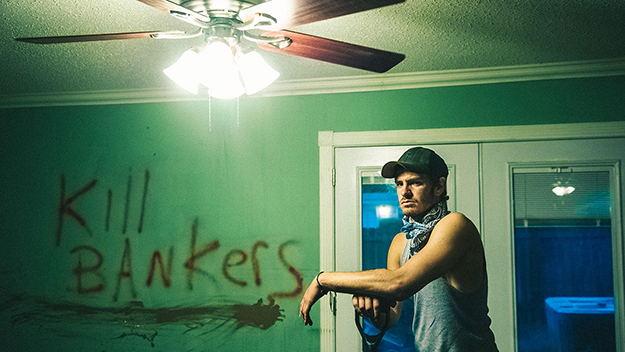Sometimes a director who displays an allusive, poetic talent in his or her early films develops a hunger for “hotter” forms of moviemaking and more “powerful” subject matter. As a result, the work coarsens, and garners more public acceptance and widespread critical acclaim. The most spectacular example was Lina Wertmüller, who went from the sensitive neorealism of her first film, The Lizards, to the tragicomic barbarism of Seven Beauties a dozen years later—and for that film became the first woman ever nominated for Best Director at the Academy Awards. American director Ramin Bahrani also began his career with highly personal neorealist films, Strangers (00) and Man Push Cart (05), reaching his peak to date in this vein with Chop Shop (07) and Goodbye Solo (08). Now he’s moved on to bludgeoning social melodramas like At Any Price (12) and 99 Homes, a relentless attack on the injustice of foreclosures. I hope he doesn’t win the applause he deserves for the wrong reasons and his worst films. Set in Orlando, Florida in 2010, 99 Homes stars Andrew Garfield as Dennis Nash, a construction worker struggling to maintain a stable home with his hairdresser mother (Laura Dern) and young son (Noah Lomax). It co-stars Michael Shannon as Rick Carver, the realtor who forecloses for the bank on Nash, then enlists him as his right-hand man. Together, they don’t just serve notices and toss families off their homesteads. They’re also literal rip-off artists. They strip properties of refrigerators and air-conditioning systems, then claim the missing items on insurance and resell the goods to banker-owners.
Under Carver’s guidance, Nash graduates to strictly white-collar crimes, like back-dating a real estate record and slipping it into court to clinch a shady deal. Carver tells Nash he should stop thinking of houses as homes and start thinking of them as so many boxes. To Carver, they mark value, and the more you acquire, the better. His vision is like the squalid, small-time underbelly of a game of Monopoly. The movie does generate journalistic heat as it depicts homeowners facing the ritualized humiliation of abrupt courtroom hearings and sheriff-run evictions. Judges faced with clearing thousands of cases must decide a foreclosure’s validity in two or three minutes flat—hence the slang phrase, “rocket dockets.” They can’t be patient with defendants who don’t know basic protocols, like whether a 30-day window to appeal will keep the bank away for a month. (In practice, it doesn’t.) Financial institutions confuse homeowners by sending clashing instructions from different departments. Realtors like Carver urge them to take “cash for keys”—a few thousand dollars in exchange for leaving their house peacefully and irrevocably. If not, the sheriffs will come knocking. Nash doesn’t accept Carver’s “cash for keys” offer. He gathers whatever goods will fit in his pickup and moves his family into a motel. Then, as he sells his soul to Carver, he goes through the disorienting spectacle of seeing his own life play out with different victims. They make the same pathetic pleas to the sheriffs—there must be a mistake, they had 30 days to appeal, they’ve been working with a lawyer—and end up in the same motel or a similar one, worried, as Nash is, that their son or daughter could experience childhood as a “motel kid.”
Bahrani packs the film with real-life extras playing cleanup crews, neighbors, and victims. They give the film some poignant moments, but they mostly add to its aura of desperation. The data-to-drama ratio goes out of whack. The script forces Garfield to overwork the furtive, questing boyishness beneath his can-do surface, and Dern’s smart, stoic mother, observant and full of common sense, lets too many weeks go by without demanding to know exactly where Nash is getting all his money. (He feels too guilty about working for Carver to confess it.) Every now and then, Bahrani and his cinematographer, Bobby Bukowski, do collaborate on some brilliant shots, like the matter-of-fact way they demonstrate that Mother Nash has moved her hair-styling business from her house to a spot right in front of her motel-room door. The freshest aspect of the movie is this family’s group chemistry. Nash is such a young single father that he’s more like a playful older brother to his son; Dern was such a youthful mother that even now she could be taken for Nash’s older sister. Bahrani, though, leaves no room in his narrative for emotional exploration. 99 Homes is a cripplingly utilitarian work, right from the opening scenes, when Nash learns that he won’t be paid for two weeks of construction, then hopelessly studies his foreclosure paperwork. Even Nash’s warm pre-motel home contrasts too easily with Carver’s personality-free McMansion. (Carver’s own wife, three daughters, and mistress barely register.) The film lacks the transcendent artistry of Chop Shop, which depicted positive thinking verging on magical thinking in the brain of a young Latino carving a niche in the Queens auto-body row known “The Iron Triangle.” And 99 Homes never approaches the depths of empathy in Goodbye Solo, about the bond forged between a down-home, rough old boy and a Senegalese cabbie in Winston-Salem, North Carolina. As for lyricism—there isn’t any. Bahrani keeps the images bright and functional while he amps up an electronic soundtrack that force-feeds you emotional cues. It’s as if he’s screwing in every piece of a pop-political fresco with a power drill. Much of At Any Price and 99 Homes play like bad Arthur Miller. In At Any Price, he set out to condemn the corrupting influence of American agriculture’s need to “expand or die.” In 99 Homes he doubles down on a death-of-the-American-Dream scenario. He starts the film at crisis-point, when Nash is ultra-vulnerable to Carver’s promises of money and security. Nash lacks the emotional or intellectual resources to counter Carver’s boastful comparison of the Great Recession to the Great Flood: if you’re a latter-day Noah faced with an economic catastrophe, you’d best say to yourself, as Carver did: “Only one in a hundred is going to get on that Ark, and I’m not going to drown.”
In At Any Price the anti-hero’s father browbeats him about the need to further the family’s Big Agra legacy. In 99 Homes, Carver becomes Nash’s Mephistophelian surrogate father. Though you wonder what makes him think that Nash could be a wheeler-dealer, Shannon is keen enough to convey Carver’s twisted faith in the man and pride in his own kill-or-be-killed wisdom. The ultimate Bad Father here is Uncle Sam. Nash and the audience are preached at and prodded to agree with Carver that that the United States “doesn’t bail out losers; it was built by bailing out winners. ” In less time than it takes to watch 99 Homes, you can immerse yourself in the Florida real-estate boom and bust by reading the chapters set in Tampa in George Packer’s The Unwinding: An Inner History of the New America. The rocket dockets filled with empty files or fraudulent documents, the reselling and repackaging of properties so no one knows who owes whom, people losing their savings, health, and sanity as they strive to hang on to their homes—Packer takes you through the whole milieu. But that’s just the context for his introduction of a character who has been surprisingly effective at fighting back: Matthew D. Weidner, the idealistic, libertarian lawyer sometimes credited with coining the word “robosigning.” Weidner has told clients: “I’ve never lost a foreclosure case.” Packer adds: “It was true, zero. Not because he was that good, though clients found him to be a fearless advocate. It was because the system was so bad.” In a triumph of literary nonfiction, Weidner comes off like a happy populist warrior even when he complains repeatedly that his head is going to explode and America is doomed. There’s more narrative art in his characterization than there is in all of 99 Homes. Without diluting his message or altering his basic premise, Bahrani could have made his movie richer and more involving by including such an original and dynamic character. Perhaps a Weidner-like lawyer could have taken on Nash as a client. Maybe Nash could have led him toward his first loss in a foreclosure court. Packer dedicates an unusual chapter in The Unwinding to the late short-story writer Raymond Carver, saluting him as “a craftsman” who saw the cramped future of this country “in the late-night trip to the supermarket, the yard sale at the end of the line.” Though Bahrani hasn’t cited Packer’s book in interviews, I bet it heavily influenced 99 Homes, down to Bahrani naming Shannon’s character Rick Carver. I wish that Bahrani and his collaborators had written the script according to the tenet Ray Carver borrowed from Ezra Pound: “fundamental accuracy of statement is the one sole morality of writing.” Change “morality of writing” to “morality of cinema” and it could be the credo for Bahrani’s early neorealism: In the working neighborhood of Chop Shop, for example, night falls like a comforter, a cloak or a shroud, depending on the youthful hero’s mood and circumstances. 99 Homes is rarely that emotionally specific, lyrical, or involving. Its finger-wagging melodrama limits both the imagery and the characters.
Nash is full of abilities yet woefully limited in imagining what to do with them. I fear the film will become an indie success because working-class men as confused and incoherent as he is fit the prejudices of art-house moviegoers. Let’s hope that what Packer says happened to Carver doesn’t happen to Bahrani: “The less articulate his characters, the more his many new readers loved the creator.” Before Bahrani earns his place on a pedestal, he needs to climb down from his soapbox.




